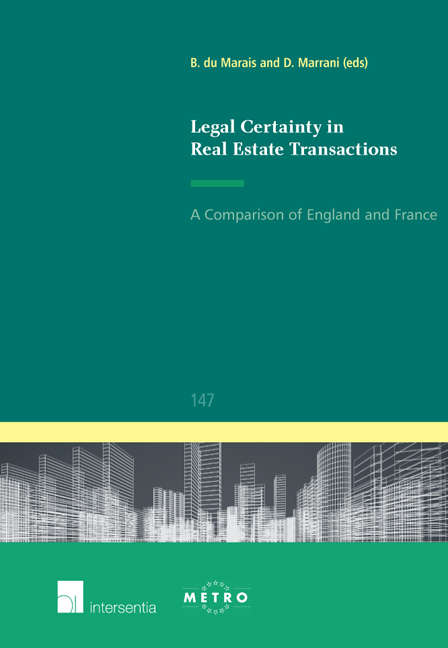Book contents
- Frontmatter
- Contents
- Introduction
- Part I The Idea Of Legal Certainty
- A Theoretical Approach
- B Practical Approach
- Part II Legal Certainty In Property Transaction: A Comparative Approach
- How to and Why Measure the Efficiency of Real Estate Transactions in France?
- Overview of how a Real Estate Transaction is Conducted in France
- Property Transactions in English Law: General Principles
- Commercial Leases in English Law
- Part III Measuring Legal Certainty
- Conclusion
- Miscellaneous Endmatter
How to and Why Measure the Efficiency of Real Estate Transactions in France?
from Part II - Legal Certainty In Property Transaction: A Comparative Approach
Published online by Cambridge University Press: 21 September 2018
- Frontmatter
- Contents
- Introduction
- Part I The Idea Of Legal Certainty
- A Theoretical Approach
- B Practical Approach
- Part II Legal Certainty In Property Transaction: A Comparative Approach
- How to and Why Measure the Efficiency of Real Estate Transactions in France?
- Overview of how a Real Estate Transaction is Conducted in France
- Property Transactions in English Law: General Principles
- Commercial Leases in English Law
- Part III Measuring Legal Certainty
- Conclusion
- Miscellaneous Endmatter
Summary
Headnote
The World Bank's successive reports on the efficiency of national law have caused much ink to flow. Despite the fact that their shortcomings have been repeatedly emphasized, the international organisation continues with its annual surveys, having only amended its method marginally. And yet, the most vigorous objections call into question its approach. Indeed, certain presuppositions in relation to the economic analysis of the law are applied with the utmost naivety, and even with a certain bias. The results are biased by a lack of knowledge and a failure to understand the legal systems that are the very focus of the study. A change of approach was thus required. At attempt has been made to understand how the rules of law are integrated in the economic transaction via interviews with professionals specialised in real estate transactions conducted by French and overseas purchasers. The result is unexpected; the rules are greatly denounced. They hide the conflicts associated with the allocation of competences among the different actors involved in the transaction.
In the World Bank's Doing Business 2014 report, France ranks 149th (out of 189) in terms of the transfer of property. This poor position is the result of the criteria chosen for the evaluation: delays and costs (evaluated here) inherent in the procedure of transfer of real estate property.
The method adopted by the World Bank has been widely criticized since the launch of this classification in 2004. The relevance of the indicators is subject to caution, while shortcomings concerning the questionnaires and insufficient data are legion. In terms of the transfer of property, for example, it can be noted that the duration of the procedure is calculated starting from the beginning of discussions in France, but only starting from the actual sale in the United Kingdom.
The very purpose of this annual report has been the subject of debate, since it consists of encouraging poorly ranked countries to proceed with the necessary legal reforms to stimulate their economic activity. However, as has been pointed out, the fact that countries with a Common Law tradition are positioned at the top of the ranking is one way of encouraging others to follow their example. While this method is brutal, doubt has been permanently cast on national practices, among which figures the transfer of property in France.
- Type
- Chapter
- Information
- Legal Certainty in Real Estate TransactionsA Comparison of England and France, pp. 69 - 76Publisher: IntersentiaPrint publication year: 2016

